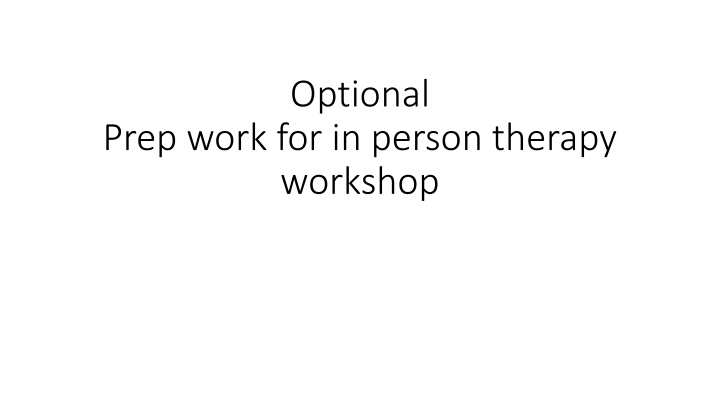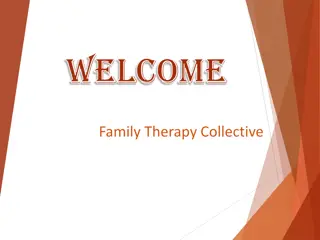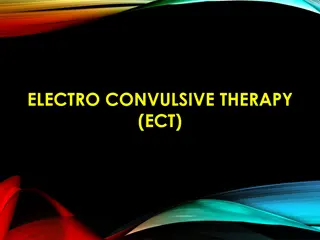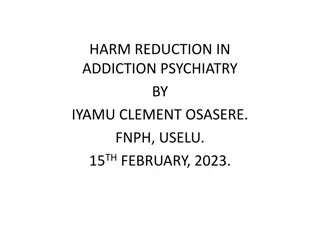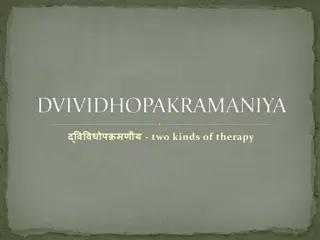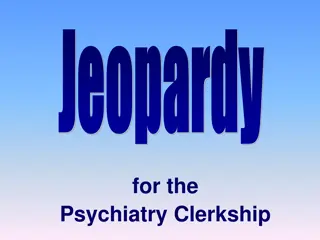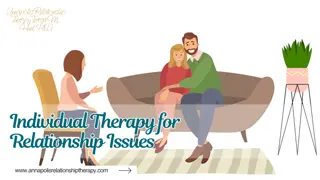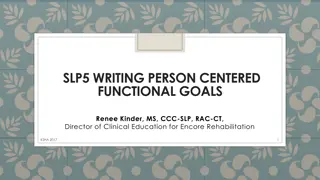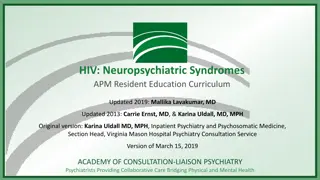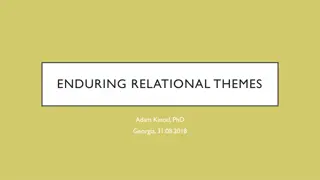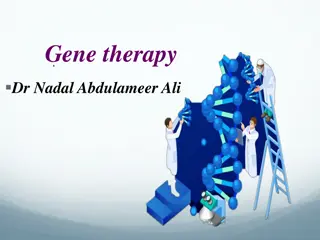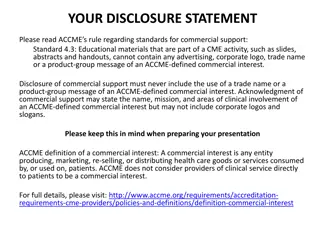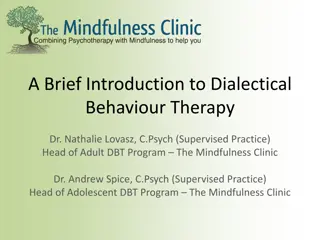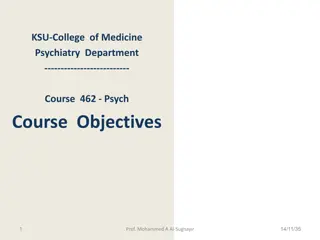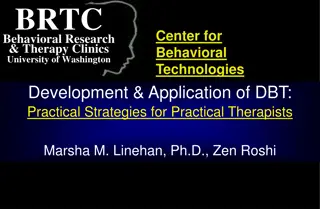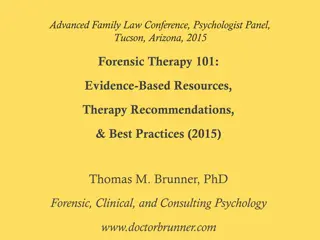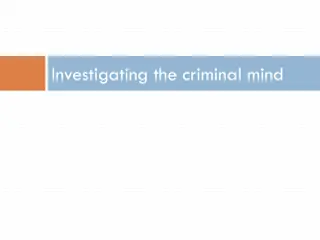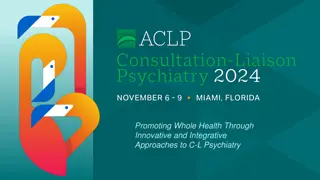In-Person Therapy Workshop: Becoming a Therapist and Understanding Psychiatry Perspectives
Dive into the world of therapy and psychiatry through a comprehensive in-person workshop covering topics such as adult learning theories, motivational interviewing, dialectical behaviour therapy, and more. Gain insights into the bio-psycho-social model and perspectives of psychiatry while enhancing your competencies as a therapist. Join us for a transformative journey towards becoming a skilled and compassionate mental health professional.
Download Presentation

Please find below an Image/Link to download the presentation.
The content on the website is provided AS IS for your information and personal use only. It may not be sold, licensed, or shared on other websites without obtaining consent from the author.If you encounter any issues during the download, it is possible that the publisher has removed the file from their server.
You are allowed to download the files provided on this website for personal or commercial use, subject to the condition that they are used lawfully. All files are the property of their respective owners.
The content on the website is provided AS IS for your information and personal use only. It may not be sold, licensed, or shared on other websites without obtaining consent from the author.
E N D
Presentation Transcript
Optional Prep work for in person therapy workshop
Outline Outline Becoming a Therapist Adult Learning theory Perspectives of Psychiatry Model Philosophy of Care Assessment content and process
Outline Date August 21 Day Monday Time 3-4 pm EST 3-4 pm EST 3-4 pm EST 3-4 pm EST 3-4 pm EST 3-4 pm EST 3-4 pm EST 3-4 pm EST Topic Understanding the Patient September 5 Tuesday Basics of Motivational Interviewing September 12 Tuesday Community Reinforcement Approach and CBT September 18 Monday Dialectical Behaviour Therapy September 25 Monday Seeking Safety and trauma treatment October 2 Monday Contingency Management October 9th Monday Community Reinforcement Approach and Family Training Putting it all together building competency in practice October 16 Monday ECHO ONMH 3
Becoming a Therapist Motivational Interviewing with Tim Guimond CAMH MI Trainer Carolynne Cooper Diagnostic Gaps covering for tim Group Training Dialectical Behaviour therapy Family therapies Trauma Contingency Management in Hospital
Becoming a Therapist Something becomes important Adult Learning theories Bandura Social Learning theory Vygotsky zone of proximal development Project ECHO community of practice Mentor Core Content Community of Practice
Perspectives Of Psychiatry We have allowed the bio-psycho-social model to become the bio-bio- bio model. Steven Sharfstein President of the APA
Perspectives Of Psychiatry Disease Dimensions What a patient HAS What a patient IS e.g., bipolar, schizophrenia, delirium e.g., IQ, personality inventory (NEO) Behaviours Stories What a patient DOES What a patient ENCOUNTERED e.g., Substance use, behaivoural disorders e.g., grief, PTSD ECHO AMPI 7
Perspectives Of Psychiatry Perspective Triad What a patient Clinical syndrome Disease Has Pathological process Etiology Dimensions Is Potentials Provocations Responses Choice Behaviours Does Physiological drive Conditioned learning Setting Sequence Outcome Stories Encounters
Assessment: content Main Goal: Engagement Addiction medicine Think Engagement Long Term Behaviourally Give Feedback for EPE Values/Importance Alcohol/Opiates Function of use Plan for comorbidities (med/psych/case management) What they need? (Case Management) Acute Intervention Skills/Strategies 10
ASSESSMENT: MENTAL HEALTH What are possible co-morbidities? Psychosis (substance related or not) Bipolar (1 vs 2) Mood/Anxiety PTSD Personality disorders Have I optimized pharmacotherapy and/or psychotherapy? 11
ASSESSMENT: MENTAL HEALTH Self report scales Mood/Anxiety PHQ 9, GAD 7 PTSD PC PTSD, PCL 5 Other Social anxiety, OCD - YBOCS Personality disorders Maclean BPD followed by BSL 23 12
Treatment https://www.ncbi.nlm.nih.gov/books/NBK64184/figure/A74172/ 13
SUBSTANCE USE DISORDERS Comorbid PTSD Core Symptoms Comorbid BPD MI Motivation Stages of Change Dialectical Behaviour Therapy Seeking Safety Relapse Prevention CBT Cognitive Processing Therapy Contingency Management Community Reinforcement Community Reinforcement and Family Training (CRAFT) 12-Step 14 Courtesy: Ketan Vegda, MD
KEY THEMES Engagement-engagement-engagement Trauma seeking safety +/- PTSD treatment Substance use behaviourally - CRA Personality disorder or impulsive behaviour DBT skills The devil is in the details 15
Assessment: content Assessment CPSO methadone guidelines has a template Certain adjustments depending on the substance of use or specialty or physician What do I do and why am I interested in the information My main goal is engagement
Assessment: content Assessment Identifying data: age, relationship status, living situation, education, source of income What are your main challenges? (including non substance related) Tell me about your typical day. Full walk through from wake to sleep Include substances, pain, activities that give them purpose and meaning and things that are distressing
Assessment: content Assessment Main Challenges Eg. Sleep, family, housing, anxiety, stress How long has it been going on, how does it affect your life? Substance use history Alcohol First use, weekly use, daily use Blackouts, seizures, withdrawal symptoms, driving, legal history What does it do for you? What is the function? Negative consequences Past treatment anticraving medication, detox, complicated withdrawal Periods of sobriety, how were you able to do it?
Assessment: content Assessment (cont) Substance Use History Opiates First used, prescribed, Running out early, pain, weekly, daily use Crush, snort, pattern, use with other drugs, IVDU Clean needles, naloxone kits Withdrawal symptoms runny nose, diarrhea, tremors, sweats, muscle twitches, cold flashes Past methadone/suboxone use, max dose
Assessment: content Assessment (cont) Substance Use History Sedatives (benzos, ghb) As previous ones Prescribed, abherrent use (snorting crushing), withdrawal syndromes What is the function of the use Stimulants IVDU, psychosis, legal Cannabis Pattern of use, what is the function Is there a withdrawal syndrome
Assessment: content Assessment (cont) Substance Use Treatment History Outpatient Detox Long term program AA/NA Medications Was it beneficial for you?
Assessment: content Assessment (cont) Past Psychiatric History First contact, past diagnoses, Medications side effects, helpful? Hospitalizations Safety (accidental/intentional overdoses Past therapy helpful? Past Medical history Medications/Allergies
Assessment: content Assessment (cont) Review of symptoms All include timeline and relationship to substance use/life events Depression Mania Anxiety generalized vs specific Flashbacks/nightmares Impact on life
Assessment: content Assessment (cont) Family history Personal History Childhood School Trauma age, how long, who, how did people respond when you told them, and how did it stay with you today Work relationships
Assessment: content Assessment (cont) Patient goals? Family/friends goals?
Addiction Medicine Treatment suggestions E-P-E elicit, provide, elicit (from motivational interviewing) Can you tell me what you know about the treatments for _____? Would it be okay if I shared some recommendations that have worked for other people? (ask permission) Here are the suggestions What did you think about them? Did any of them work for you?
Addiction Medicine TREATMENT Detoxification (withdrawal) Alcohol Benzodiazepines, CIWA, librium, gabapentin Opiates Buprenorphine Not recommended due to loss of tolerance Benzodiazepines Medical detox CAMH Taper 5-10% every 1-2 weeks (slow down rate as you go) Adjuvant meds gabapentin, pregabalin, carbamazepine Cannabis Nabilone, gabapentin, mirtazepine
Addiction Medicine TREATMENT Maintenance Anti craving medications for alcohol Naltrexone Accamprosate Gabapentin, topiramate, baclofen (disulfiram) not anti-craving
Addiction Medicine TREATMENT Maintenance Opiate Use Disorders Methadone Buprenorphine SROM and others (Pain) Structured Opioid Therapy McMaster guidelines Naltrexone Stimulant Use Disorders Limited evidence for stimulant use disorders Topiramate, bupropion
Addiction Medicine TREATMENT Concurrent disorders Treat the disorders that are present Think behaviourally/psychosocially Think about integrated vs sequential
SUMMARY There are four main categories in the perspectives of psychiatry assessment: disease, dimensions, behaviours and stories The main goal of assessment is engagement, with a focus on the following: acute interventions, determining long term treatment plan, comorbidities Concurrent disorders needs consideration for Location Co-morbidities 32
Thank you Feedback to Becca Quiz questions 33
quiz What are the key quardants of the perspective of psychiatry model? 34
quiz What are the key quardants of the perspective of psychiatry model? Disease Dimensions Behaviour Stories 35
quiz What is the most important component of the assessment with someone with Substance use? 36
quiz What is the most important component of the assessment with someone with Substance use? ENGAGEMENT Motivational interviewing Skills DBT Trauma- Seeking safety Replacing function of use CRA CBT Environment - Contingency Management Family - CRAFT 37
quiz What co-morbidities are worth screening for? 38
quiz What co-morbidities are worth screening for? Mood/anxiety phq 9 and gad 7 PTSD pc ptsd screen and pcl 5 Personality maclean bpd screener and bsl 23 39
